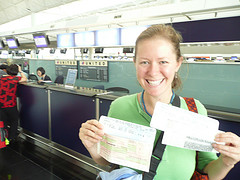 When you finally get through the ritual mugging that is now passing through security, and find your departure gate, the last thing you want to hear is that the plane is overbooked.
When you finally get through the ritual mugging that is now passing through security, and find your departure gate, the last thing you want to hear is that the plane is overbooked.
Some travelers who have flexible schedules find an overbooked plan a treat: they can forfeit their seat, take the voucher and meal coupons, and hang out until the next flight.
For others, it can mean a rough scramble for an alternative way to get to an important business meeting or to your child’s school play.
So what is bumping and overbooking after all?
To be bumped off a flight is to be denied a seat even when you have a reservation. This is the direct result of overbooking, which is a common practice by the airlines to fill all the seats and then some because some passengers won’t make their flight. Essentially, the airlines are betting that someone won’t show up and they’ll get everyone on and have a full flight – more revenue for them.
In some cases, however, everyone shows up and wants to get on that flight, and so the airlines will offer a reward to the traveler who can forfeit their seat. These are typically future air vouchers, cash, and meal tickets and they’ll get you out on the next available flight. The longer the delay, the better the pay-off.
If the airline cannot secure enough volunteers the first go around, they will often sweeten the deal with additional cash and other benefits like drink coupons, upgrades, and more. Â the volunteer system works really well even when the number of travelers to get bumped increases over the holidays and busy seasons.
Can you get bumped involuntarily?
Sure you can, but it’s not likely. The volunteer system works really well even when the number of travelers to get bumped increases over the holidays and busy seasons. Still, if you absolutely have to avoid being bumped, arrive as soon as possible because the last passengers to check in are typically the ones who will find themselves involuntarily bumped.
What does the law say about overbooking and bumping?
The Department of Transportation has guidelines outlining overbooking procedures. These are available in their Consumer Guide to Air Travel.
In brief: if the alternative flight will get you where you are going within one to two hours on domestic flights, or within one to four hours on international flights, then the airline must pay you double the cost of your one-way fare up to a maximum of $650. The reimbursement amount increases based on how many hours you are delayed and whether it is a domestic or international flight.
Important! The bumping rules don’t apply to charters or planes with fewer than 30 seats. They also don’t apply to flights inbound to the U.S. or flights between foreign cities because that is outside U.S. airspace. Foreign airlines have their own set of rules.
Your travel insurance travel delay coverage will help you when you are not compensated by the airlines. That is, when your flight is canceled due to severe weather, natural disasters, unannounced strikes, civil riots, and more. If you are compensated by the airline for the delay, your travel insurance won’t provide additional funds, which makes sense when you think about it because that would essentially be getting reimbursed twice.
